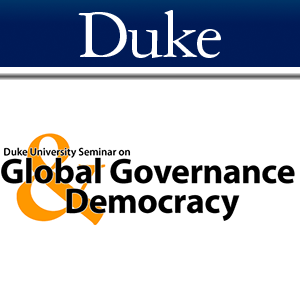Discover Global Governance and Democracy
Global Governance and Democracy

Global Governance and Democracy
Author: John Hope Franklin Center
Subscribed: 1Played: 8Subscribe
Share
Description
The University Seminar on Global Governance and Democracy, founded in 1997, is an interdisciplinary seminar that brings together faculty and graduate students from across the social sciences, especially from political science, public policy, economics, sociology, and law. Our shared interest in this seminar is to gain a better understanding of the causes and consequences of recent global economic and socio-political changes; we are especially interested in how globalization affects the distribution of wealth and well being, as well as governance among and within nations.
33 Episodes
Reverse
Contextual changes characterized by the globalization of agricultural value chains, rising income, and rapid urbanization not only influence patterns of consumption, competition, and trade but also drive agricultural development and innovation far more than before across sub-Saharan Africa (SSA). Agriculture increasingly occurs in a context where private entrepreneurs coordinate extensive value chains linking producers to consumers, sometimes across vast distances. More providers of knowledge are on the scene, particularly from the private sector and civil society, and they interact in new ways to generate ideas or develop responses to dynamics in agri-food value chains. A growing number of entrepreneurial smallholders are organizing to enter these value chains, but others struggle with the economic marginalization as innovative solutions do not reach them due to missing links in the value chains.
John Bartlett, Professor of Medicine, Global Health, Associate Director for Research of the Duke Global Health Institute, Co-Director of the Duke University Center for AIDS Research Creative Solutions to the Global Needs in Human Resources for Health
Célestin Monga, a Cameroonian national, is Senior Advisor at the World Bank where he has held positions in both operations and in the research department, including as Lead Economist in Europe and Central Asia, and Manager of the Policy Review team in the Development Economics vice presidency. He is also the Director of the forthcoming Oxford University Press Handbook of Africa and Economics. He has served on the Board of Directors of the Sloan School of Management’s Fellows Program at the Massachusetts Institute of Technology (MIT) and taught economics at Boston University and the University of Bordeaux (France). Prior to joining the World Bank, he was Department Head and Manager in the Banque Nationale de Paris group. He was the Economics Editor of the 5-volume New Encyclopedia of Africa (Charles Scribners & Sons, 2007). His books, which cover various dimensions of economic and political development, have been translated into several languages and are widely used as teaching tools by academic institutions around the world. He holds degrees from MIT, Harvard, and the universities of Paris 1 Panthéon-Sorbonne, Bordeaux and Pau.
Raphael Kaplinsky is Professor of International Development at the Open University in the UK. In the late 1990s, together with a network of researchers led by Duke University and the Institute of Development Studies at Sussex, he helped to extend and develop the Global Value Chains research framework. Since 2006 his principle theme of research has been on the impact of China on Africa. As part of this he has focused on the macro-economic impact, the impact of China on Africa's external trade and on its industrial and resource sectors. His recent books include a widely cited text on Globalisation (Globalisation, Poverty and Inequality), on China's impact on the global commodities sector (The Impact of China on Global Commodity Prices) and the breadth and depth of linkages from the commodities sector in Africa (One Thing Leads to Another: Making the Most of Commodities in SSA). He is currently seeking to initiate a global, networked research programme on Inclusive Innovation.
Professor Stijn Claessens, International Monetary Fund
Understanding Financial Crises: Causes, Consequences, and Policy Responses
John Hope Franklin Center
John Hope Franklin Center
John Hope Franklin Center
John Hope Franklin Center
John Hope Franklin Center
John Hope Franklin Center
John Hope Franklin Center
John Hope Franklin Center
John Hope Franklin Center





















